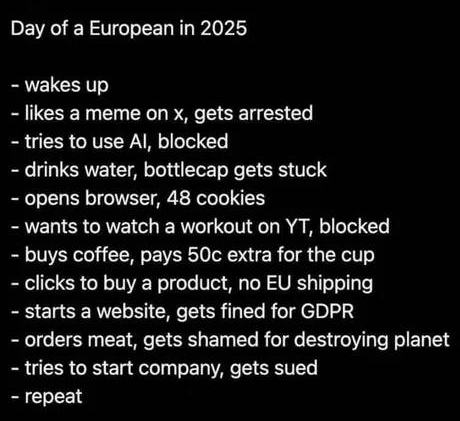
There’s a lot of debate about the big axis of power today: America and China (ed: what about India?). Both have massive tech giants and both have super economies. Where does this leave Europe?
It’s interesting for me in that most of the discussion is that Europe and Eurocrats strangle all innovation with regulation or, as many would call it, Europe’s strangulation.
This came up today when I saw a friend comparing Europe’s biggest companies with America’s:
In fact, when you add a layer on this, Europe is becoming the world’s museum of old fortunes gone bad. This is because Europe is no longer exporting goods but focusing upon importing tourism to see their sights of old, a point emphasised the other day by The Telegraph: How Europe is embracing industrial decline to become the world's museum. I heard the same comment recently in Brussels where the Grand Place – the main square – was filled with Asian tourists. My colleague turned to me and said: “so, this is Europe’s museum”. Hmmmm …
It is interesting that Europe has ceded power to America and China and then encourages them to visit us, to see our sights and history. The real question has to be: so, what has Europe got to develop for the future?
That’s a difficult question, particularly after Brexit, the Ukraine conflict and questions over France, the future of the Euro and more. Equally, the big difference between Europe, America and China is that, like it or not, America and China are run as a single state, as is India, whilst Europe is 27 divided states.
Having dealt with European regulations in financial services for decades, it is clear that there is no European market. Politicians are trying to create one, but the market is divided. Every European country has a different interpretation of directives. Unless the European Parliament and Commission make directives regulations, they are divided.
I always remember talking to a European Commissioner years ago about MiFID (the Markets in Financial Instruments Directive) who said that the aim was not to get all of Europe working as one, but to get all the sheep in the same pen. In other words, each European directive was aimed at getting all the countries to align in the same direction, but with space to differ. Then, over time, the directive’s objectives was to make the pen smaller so that all the sheep pointed the same way. That’s why we have PSD3, CRR3, UCITS5 and more. Each iteration of the regulation tightens the rules and makes the pen smaller.
The problem then is this: as Europe focuses upon rules and regulations, America and China focus upon free markets and trade. The focus is different and the GDP results are different. Having said that, I then have a friend who believes that Europe is better, as life is not about GDP and trade ... it’s about friends and family. Europe takes more downtime than most economies, and allow more focus upon enjoying life. This is articulated well by Jatin Modi, CEO at Renaissance. Jatin is an Indian by birth but lives in Lithuania, and says that Europe’s system is not necessarily causing its decline, but is its feature. He recalls talking with a German CEO who told him: “Why would I want to 10x my business when my current size lets my employees leave at 4 PM for their family?”
He believes that “the same forces that strangle innovation have created something remarkable. 30 of the world's 50 most liveable cities are European. The continent has mastered something more elusive than unicorn creation - the art of balanced living.
“I see this daily living in Lithuania. My American friends measure success in stock options. My Indian network celebrates 80-hour work weeks. Meanwhile, my European colleagues vanish to their summer houses every weekend, treating leisure with the same seriousness as their quarterly targets. What if Europe's ‘decline’ is not a bug, but a feature?”
The key question here is whether life is about living or about profit. What’s your view?
Chris M Skinner
Chris Skinner is best known as an independent commentator on the financial markets through his blog, TheFinanser.com, as author of the bestselling book Digital Bank, and Chair of the European networking forum the Financial Services Club. He has been voted one of the most influential people in banking by The Financial Brand (as well as one of the best blogs), a FinTech Titan (Next Bank), one of the Fintech Leaders you need to follow (City AM, Deluxe and Jax Finance), as well as one of the Top 40 most influential people in financial technology by the Wall Street Journal's Financial News. To learn more click here...



